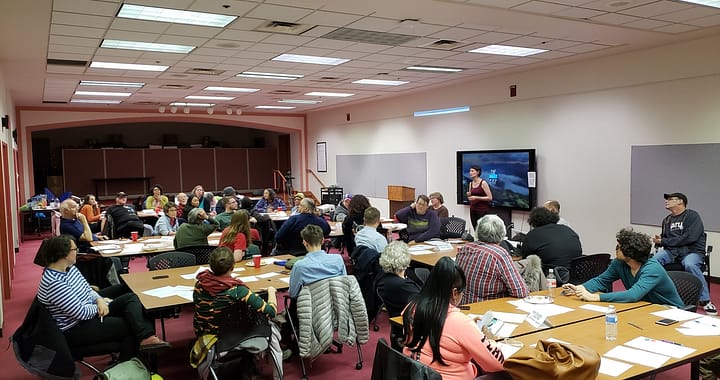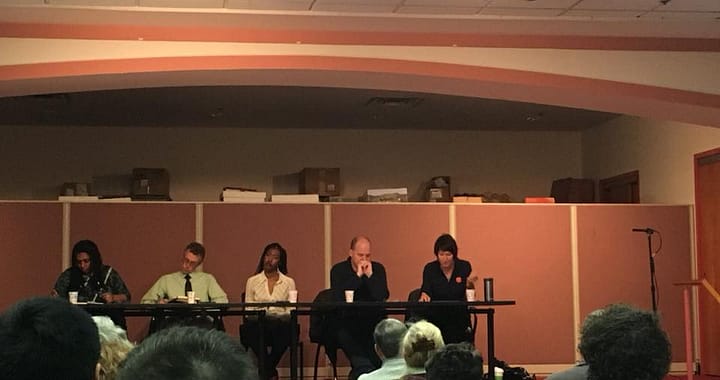At this month’s Port Authority Board meeting, PPT presented a final list of organizations and individuals that have signed on to the demands letter around the BRT. PPT has been working closely with Just Harvest around this campaign for the past several months. Here is the letter in full with the signees listed at the bottom of the page:
BRT ORGANIZATIONAL SIGN-ON LETTER
To the URA, the City of Pittsburgh, Allegheny County, and the Port Authority of Allegheny County:
We the undersigned organizations, institutions, social service agencies, businesses, managers, and elected leaders are deeply troubled about the impact of Pittsburgh’s Bus Rapid Transit (BRT) plan on our communities. In its current design, bus riders of the 61 A, B, and C routes will see a 45% reduction in frequency of service, and riders of the 61 A, B, and C will be facing the additional financial and physical burden of mandatory transfers in Oakland to travel to Uptown or Downtown. Bus lines are lifelines. For many of our residents in the East End and Mon Valley, the halving of their vital transit service frequency will be the difference between keeping and losing their jobs, and keeping or losing childcare. Riders in these communities are disproportionately transit-dependent, and many riders are the service workers and customers that are the economic engines of Pittsburgh’s largest employers. Paying an additional $2.00 for CONNECT card users or $5.50 for cash users each trip in additional transfer fees is prohibitively expensive for most households and will also have devastating impacts on residents’ access to basic services and needs, including food, healthcare, connections to family and places of worship. Finally, this is further disinvestment in communities like Rankin, Braddock, Duquesne and McKeesport, which have been hardest-hit by deindustrialization. Access to transit is essential for stimulating business development and resettlement, and this plan threatens progress that has been made in this region.
The community engagement and meetings in the lead-up to the federal BRT grant submission lacked survey data and meeting input from riders and residents of Mon Valley communities who would be hurt by the BRT. There must be greater efforts to evaluate transit service alternatives for Braddock, Duquesne and McKeesport residents. We also insist on further robust public engagement with residents of the Mon Valley in any BRT service modifications that will impact their transit. The improvement of transit in the Oakland-Downtown corridor should not happen on the backs of residents in the Mon Valley, who are disproportionately of the low-income, minority, senior, and disabled communities, as well as those that do not have access to a car. Port Authority needs to follow their own equity mandate in their service guidelines and their obligations under federal law, and not invest significant capital money in creating greater hardships for protected classes and low-income riders. The BRT should instead be used as an opportunity to reconsider how our transit network can better serve the needs of all our county residents.
We insist on the following:
- That there be no cuts to frequency on the 61 A, B, C lines, nor changes to early morning/late evening service.
- There must be direct, all-day service to downtown from all impacted communities.
- Any newly-created transfers from 61 or 71 routes to BRT lines must be free.
- Additional CONNECT card vendors and kiosks should be added in the Mon Valley to address gaps in access.
- Capital money should be allocated towards expansion of the MLK East Busway into Braddock into Monroeville or McKeesport.
We look forward to on-going discussions how the BRT project can be a catalyst towards improving transit connectivity and access to vital services for all, without any communities left behind.
Sincerely,
Wilkinsburg Borough Council
Rankin Borough Council
East Pittsburgh Borough Council
North Braddock Borough Council
Swissvale Borough Council
Duquesne City Council
North Braddock Cares
Swissvale Economic Development Corporation
Swissvale Community Action Committee
Woodland Hills School Board
Nickole Nesby, Mayor of Duquesne
Mayor Betty Esper of Homestead
Mayor Thomas Whyel of North Braddock
Mayor Marita Garrett of Wilkinsburg
Fawn Walker-Montgomery, McKeesport Councilwoman
Braddock Carnegie Library Board of Trustees
Director Kate Grannemann Coluccio of Swissvale Library
Pittsburgh Human Rights City Alliance
Pitt Human Rights Initiative
NAMI Keystone Pennsylvania
Howard Levin Clubhouse
Metro Community Health Center
Pittsburghers for Public Transit
Just Harvest
ACCESS Mob
Aunt Cheryl’s Cafe in Braddock, PA
Carl’s Cafe in Rankin, PA
Women’s Law Project, Western PA Office
One Pennsylvania
350 Pittsburgh Climate Action
The Thomas Merton Center
Sequal Consulting
Pennsylvania Interfaith Impact Network
Women and Girls Foundation
Casa San Jose
The Alliance for Police Accountability
Planned Parenthood of Western PA
Dave Swanson, Pastor of Pittsburgh Mennonite Church











